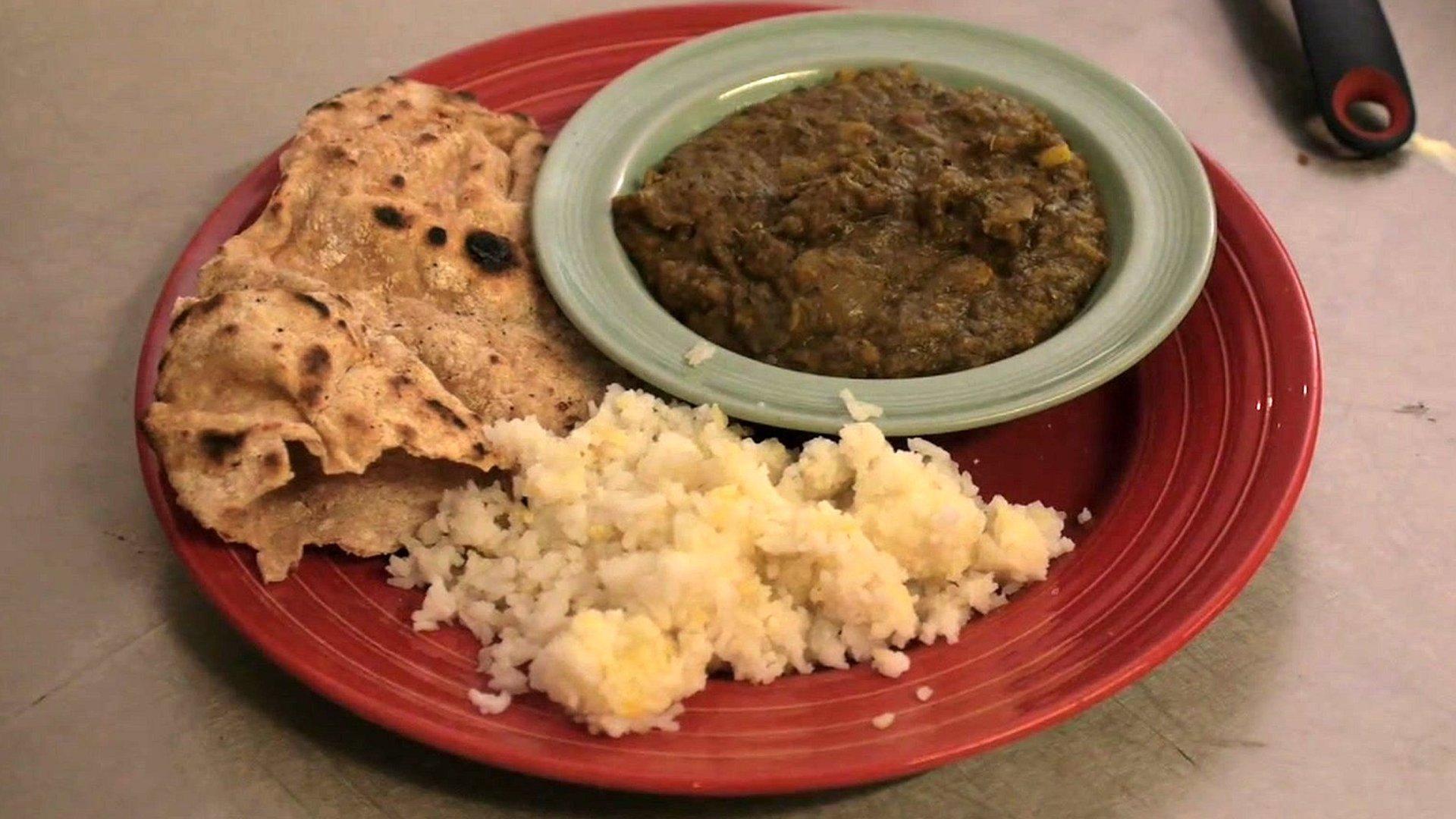Reducing food waste: The war on leftovers in Wales
- Published
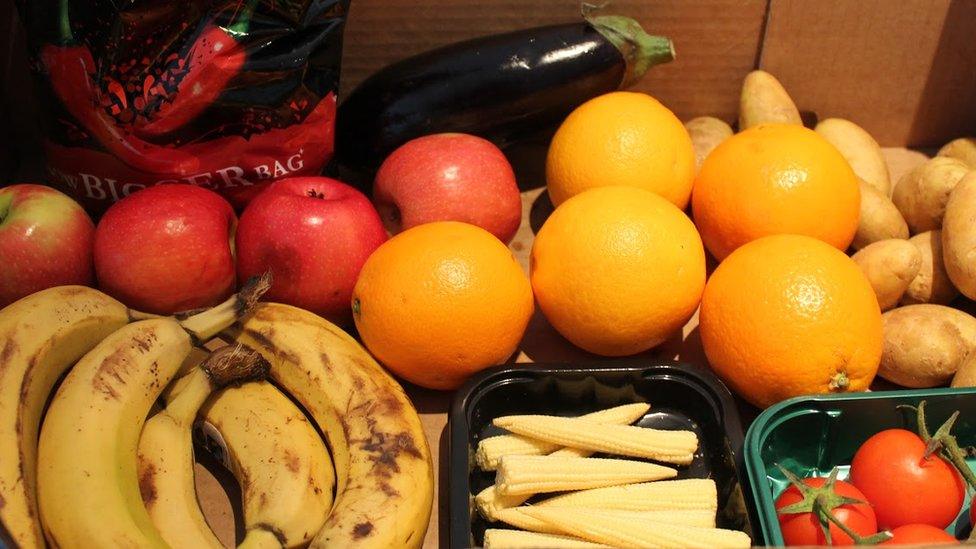
Produce donated to the Bethesda Pay As You Feel Café, where meals are cooked with food that would otherwise be wasted
In Wales this Christmas, we will throw away one in five of all turkeys purchased.
The festive season is a prime time for food waste, with UK households throwing away 23,000 tonnes of food worth £275m, according to Waste Awareness Wales.
But some people in Wales are finding novel ways to combat this waste, from cooking with leftovers, to serving up food destined for landfill.
"Saving the planet, benefitting our pockets, it's a double whammy," said Lia Moutselou.
The Cardiff food blogger runs cooking classes through Lia's Kitchen, external, based around the use of leftovers.
She has been working with the Love Food Hate Waste campaign to help show people how they could save up to £60 a month per household, by changing the way they think about food.
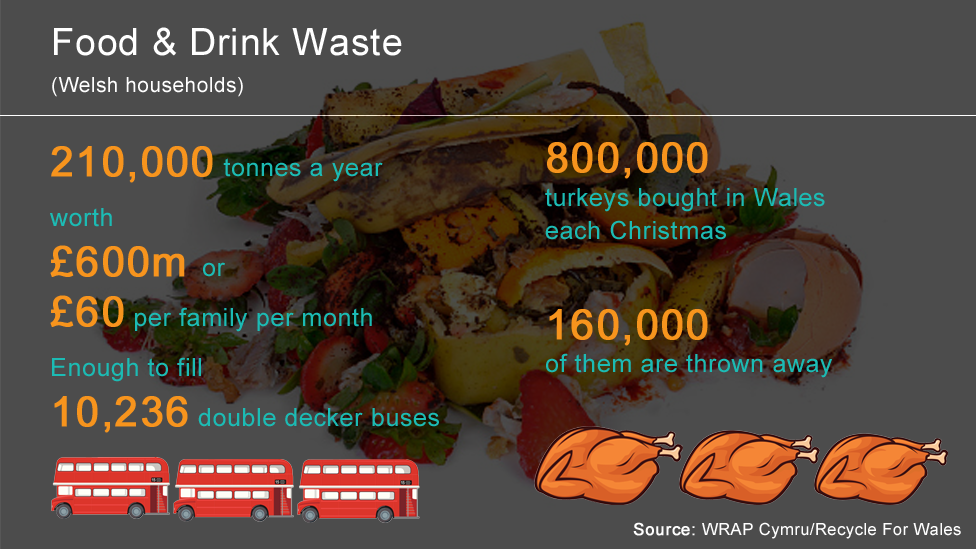
Of the 400,000 tonnes of food and drink thrown away in Wales each year, more than half is "good food" that could have been used.
"I think sometimes reducing food waste makes you very creative in the kitchen. You come up with ingredients and recipes that you would never have thought could be put together," she said.
Ms Moutselou also plans to hold workshops at the Oasis organisation in Cardiff, to help refugees and asylum seekers find out how they can save money on food.
"I think that it is really important to give people from certain backgrounds education on how to save money and eat well, to give them knowledge of what is nutritional, cheap and how they can make more of buying in bulk" she said.
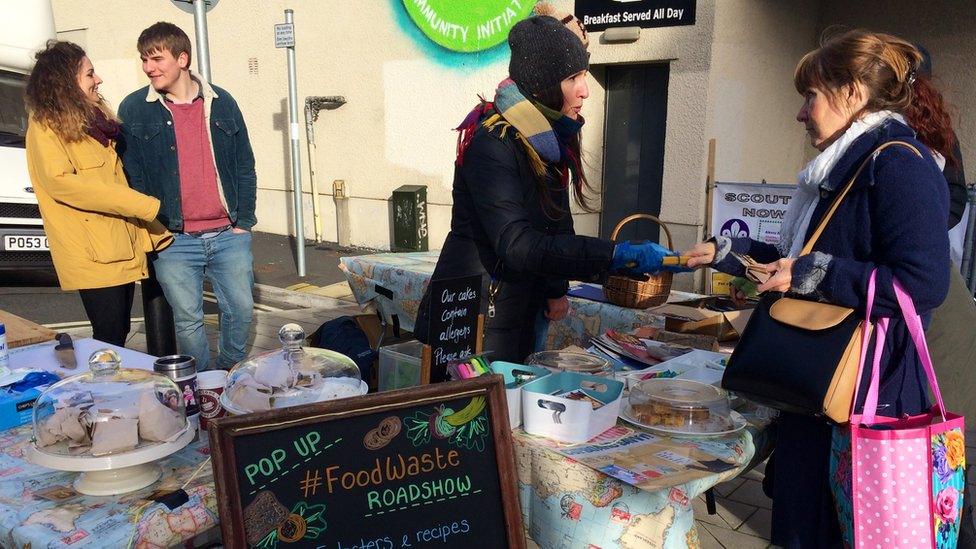
Lia Moutselou handing out cake samples at a food waste roadshow on Cardiff's Albany Road - the cakes were baked using leftover ingredients
Also teaming up with Love Food Hate Waste, external at their food waste roadshows is Becca Clark, from Green City Events, external.
"It's always a real shock to find out how much food is being wasted and then a few doors down you've got families in food poverty," she said.
"I think a big incentive for people to cut down on waste is that they'll actually save money, just by using things differently, storing food properly, portioning and making food out of leftovers."
Ms Clark's advice is to "plan your meals really well, get your portions right, store food properly and get adventurous with your leftovers," to cut down on household food waste.
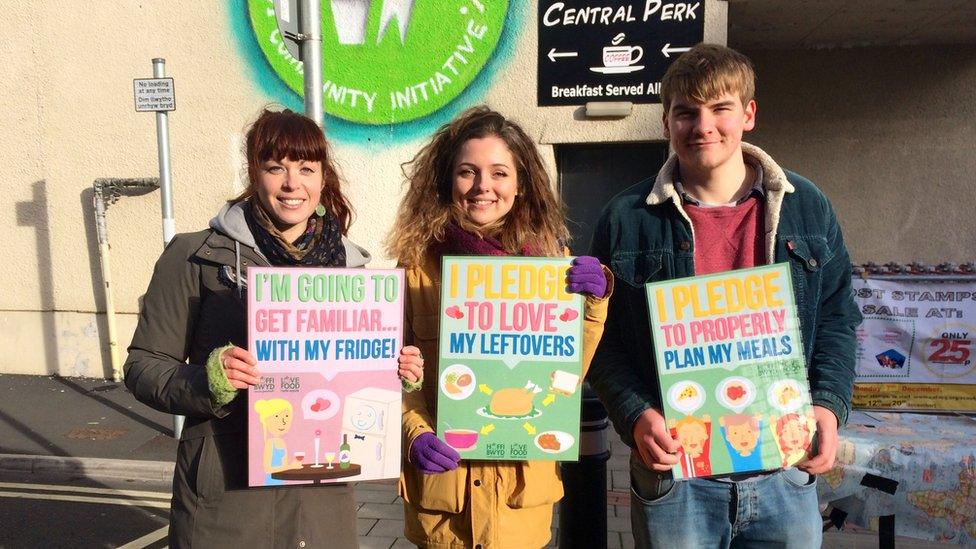
Becca Clark and her team of volunteers with advice on how to reduce household food waste

Supermarkets
While household food waste accounts for almost 50% of all food waste produced in the UK, 11% comes directly from retailers including supermarkets.
Waste reduction charity WRAP estimates the amount of food and drink thrown away by retailers and wholesalers is about 250,000 tonnes in the UK each year.
France has just passed new legislation banning supermarkets from throwing away or destroying unsold food, instead forcing them to donate it to charities and community organisations for redistribution.
Julie Morgan AM thinks similar laws should be passed in Wales.
"Some of our supermarkets are already doing this, but would it be possible to pass a law compelling them to make those sorts of arrangements so that the food does not go to waste?" she asked in the Senedd on 18 November.
"To me, it is outrageous that so much food goes to waste, when poor families and people are struggling to make ends meet," she said.
Some supermarkets in Wales, including Tesco, Asda and The Co-operative, are already working with organisations such as FareShare Cymru, external.
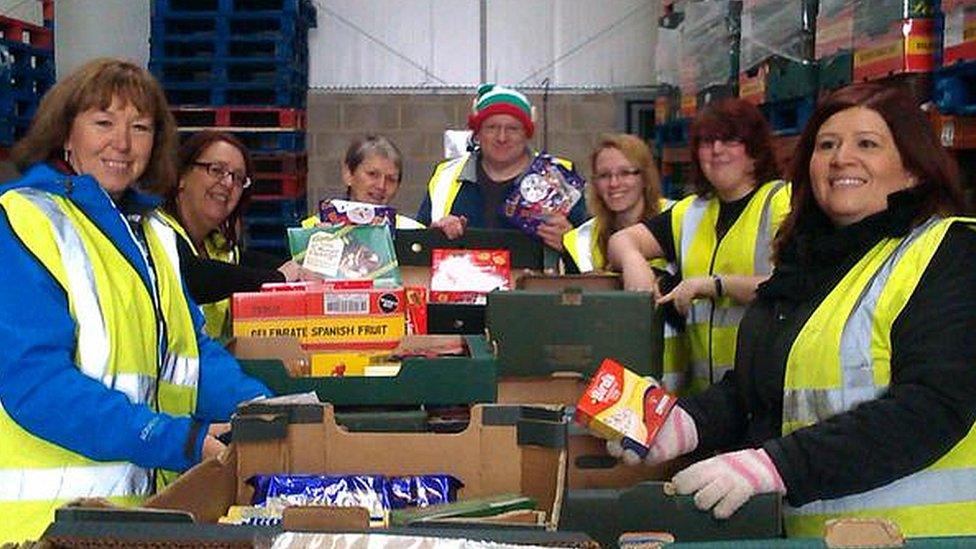
FareShare Cymru volunteers sorting food donations last December
They take "good quality, surplus edible food from the food industry and redistribute this to organisations that feed people in need," said project manager Sarah Germain.
About 540,000 tonnes of food have been saved in south Wales over the last year, providing enough for more than 1.2 million meals at 45 different charities including homeless hostels, women's refuges and luncheon clubs.
Last Christmas, they distributed surplus turkeys to organisations cooking festive meals, and have so far received potatoes, cauliflowers and satsumas to redistribute over this year's festive period.
WRAP Cymru, external also works with businesses to try and cut down on food waste.
For example, they helped set up a surplus food project at Sainsbury's Queen Street branch in Cardiff, enabling spare food to be collected by two local charities, Bawso and Cardiff Women's Aid.

Pay as you feel
Since the opening of The Real Junk Food Project in Leeds in 2013, a network of similar cafés has opened in the UK, based on the concept of serving up food that would otherwise be wasted, in exchange for payments based on what the customers feel the meals are worth.
In north Wales, the Bethesda Pay As You Feel Café, external was opened by Denise Baker-McClearn in spring 2015.
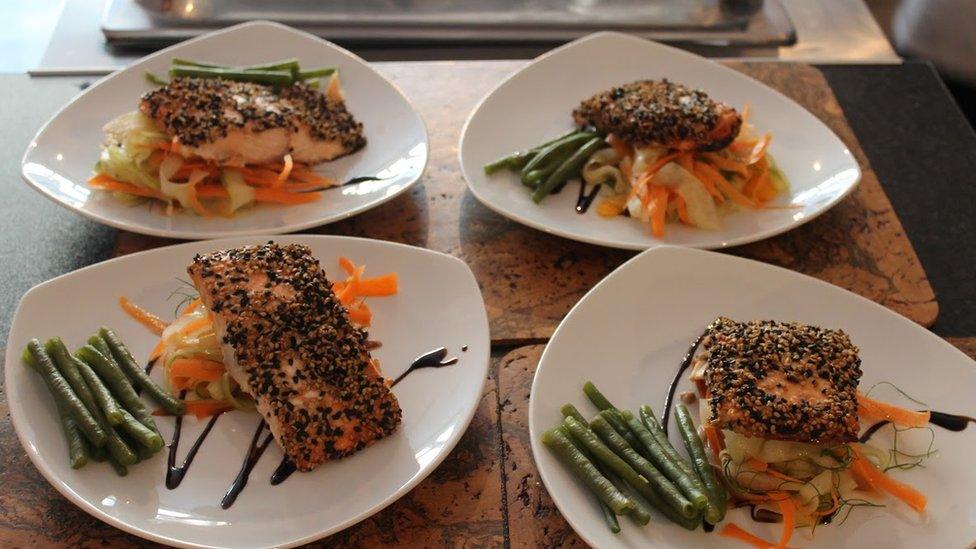
Food served up at the Bethesda Pay As You Feel Café
Alongside concerns about the environmental impact of food waste, Ms Baker-McClearn was also concerned about "the human cost to people paid a pittance on one side of the world, then it's shipped here and ends up in the bin".
She works with various local suppliers who donate their food waste, the local Londis and Morrisons for example.
The food they cook depends on what comes in daily, so sometimes they get large quantities of certain ingredients.
"We recently received 85,000g of bacon from Stenaline, which is currently in the freezer. We don't get that much meat normally," she said.
The café is currently closed for renovations but hopes to re-open properly in the new year, serving evening meals in exchange for customers paying as they feel.
She said this business model "has proven to be viable as we have a loyal customer base and everything balances out.
"Most people who come into the café support the idea of where the food has come from, and since Hugh's War on Waste has been on television, people are actively starting to look for it."
- Published7 November 2013
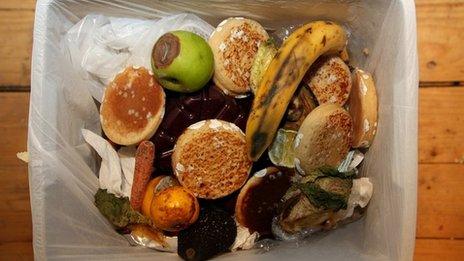
- Published28 October 2015
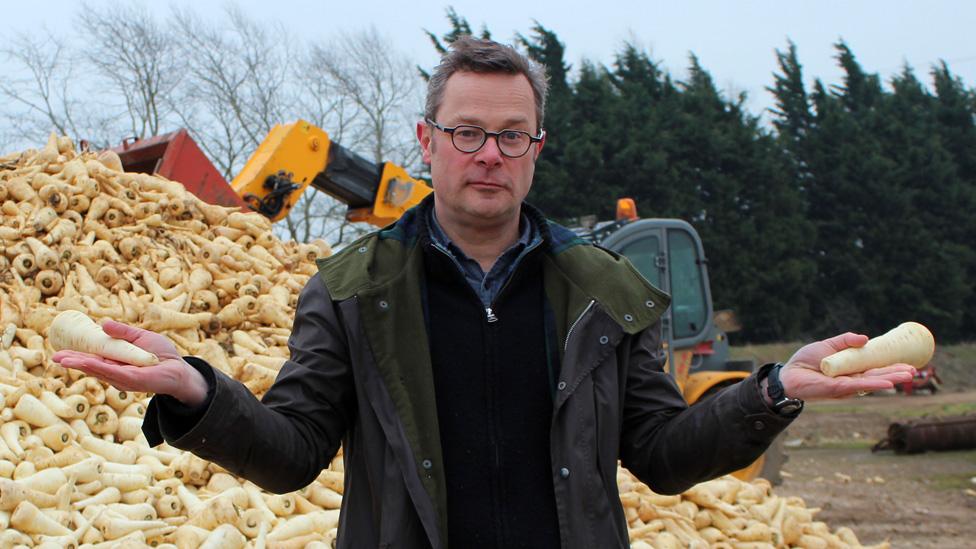
- Published23 July 2014
